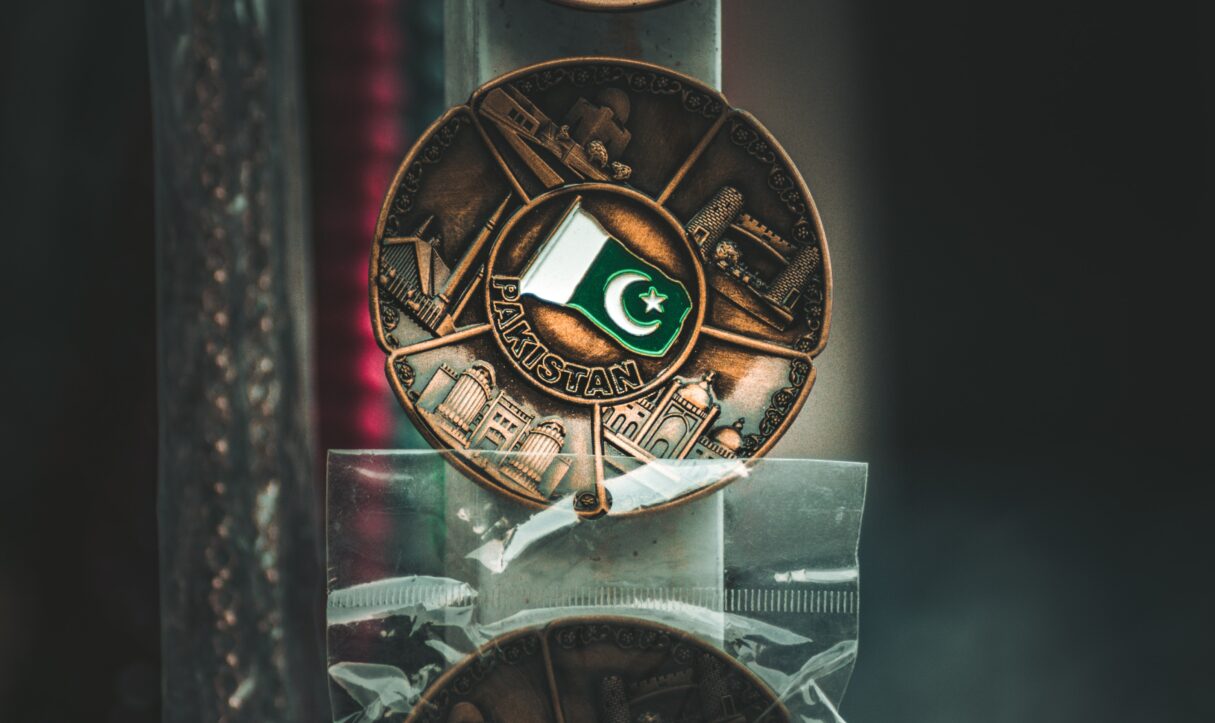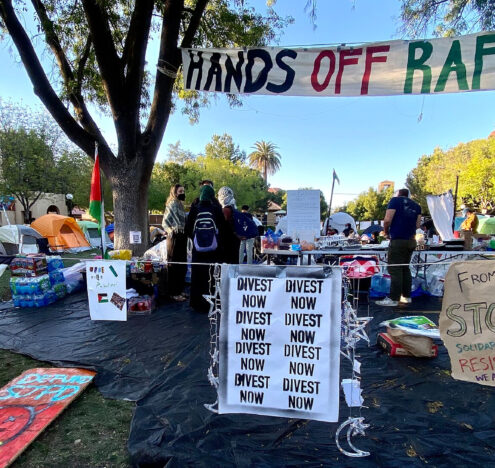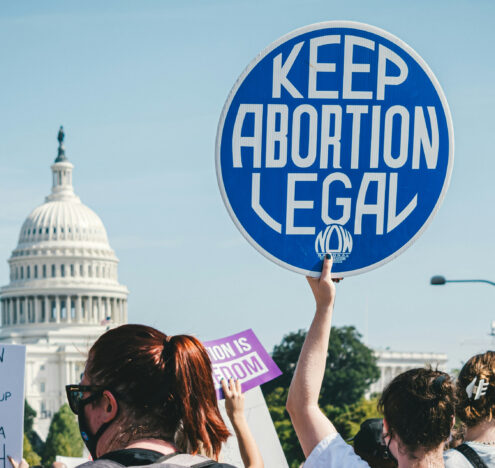On August 5, 2023, Imran Khan, Chairman of the Pakistan Tehreek-e-Insaf (PTI), was sentenced to a three-year imprisonment term and disqualified from holding office for alleged involvement in “corrupt practices” when he served as prime minister from 2018 to 2022. The arrest unfolds within the broader context of an unwavering summer crackdown on the PTI after Khan’s fallout with Pakistan’s politically powerful military.
Protests erupted following Khan’s initial arrest on May 9, 2023 in unprecedented fashion. Amidst a nationwide uprising, citizens stormed the military’s General Headquarters in Rawalpindi and burned the Corps Commandar’s residence in Lahore. In response, the military launched a Gestapo-style crackdown on the PTI. The military truncated PTI’s second-and-third tier leadership and indiscriminately detained thousands of PTI supporters present at the protests through arbitrary “geofencing.” Many civilians remain on trial in military courts, while those less fortunate remain “missing” to this date.
Khan’s prospects for competing in the next electoral cycle seem done and dusted. He is facing over 150 alleged cases since his ouster, including charges of corruption, terrorism, and blasphemy. The August 5 verdict is expected to be challenged in superior courts. However, alternative legal proceedings could achieve the state’s desired end of orchestrating the disqualification of Pakistan’s last democratically elected prime minister.
Khan calculated that the PTI could take on the omnipresent military after his ouster in April 2022. However, the ensuing crackdown after May 9, 2023 has tempered this calculation and created an environment of fear and intimidation in Pakistan. Nightly television programs do not utter Khan’s name following state directives. For instance, in June 2023, a renowned anchor had to correct himself on live television after saying his name: “He filed an application under article six against Imran Khan…I apologize, against the chairman of the PTI.” PTI followers and leaders have largely self-censored themselves in hopes of evading a crackdown that has gutted the party. Khan also remains blacklisted in Pakistan’s mainstream media to date.
Continued apathy for Pakistan’s democratic backsliding, human rights abuses, and the declining rule of law is antithetical to the Biden administration’s stated foreign policy strategy of centering democratic values and human rights in foreign policy engagements.
PTI’s support lies in Pakistan’s sizeable diaspora, which has emerged as potential torchbearers as dark clouds encircle the party within Pakistan. Spurred by their mobilization in Washington, London, Toronto, and elsewhere, international media outlets have reported on PTI’s sordid summer more scrupulously than Pakistan’s mainstream media. Of the approximately nine million overseas Pakistanis, perhaps none are more consequential for Pakistan’s domestic politics than the roughly 630,000 residing in the United States.
The Pakistani Diaspora’s Outreach in Washington
Diaspora groups have protested against domestic political developments in Pakistan across the United States and raised awareness in Washington’s power corridors. While their collective influence pales in comparison to Indian and Israeli caucuses in Washington, the Pakistani-American diaspora is gaining traction in US politics and bringing attention to PTI’s plight.
In recent months, segments of the Pakistani-American diaspora have attempted to influence US foreign policy changes toward Pakistan through lobbying, street campaigns, and congressional outreach. In May 2023, 66 members of Congress signed a letter to Secretary of State Antony Blinken urging the United States to reiterate the importance of Pakistan’s commitment to democracy, human rights, and the rule of law for US-Pakistan relations. In July 2023, nine members of Congress held a briefing on human rights in Pakistan. Following Khan’s recent arrest, PTI officials suggested that Congress may send a fact-finding team to Pakistan in mid-August 2023, followed by a congressional hearing.
The salience of this recent congressional outreach has, so far, proven futile. Shifts in US foreign policy are slow without buy-in from the executive, the State Department, and the Pentagon — the three movers of US foreign policy. Amidst the PTI crackdown, the State Department called on Pakistan for vague adherence to the “rule of law and democracy,” claiming that the US government has no stance on “private citizen” Khan. The State Department adjudicated Khan’s August 5 arrest as an “internal matter.”
Military-to-military cooperation generally remains unabated by ongoing political developments. Pakistan’s dependence on US weapons systems, shared concerns over select terror groups, vital US support during economic crises, and Pakistan’s hedging strategy between the United States and China continue to supersede Pakistan’s political instability between Rawalpindi and the Pentagon.
While members of Congress use their bully pulpits to persuade policymakers, it is important to reiterate that Washington’s policy toward Pakistan has not shifted following the army’s undemocratic crackdown on Pakistan’s largest political party.
Washington’s Unchanging Policy
Washington’s relative silence surprises many because of divergent US responses to parallel undemocratic crackdowns in the region. The US government restricted visas for Bangladeshis believed to undermine the democratic election process in May 2023, concurrent with the worst phase of the PTI crackdown. In Myanmar, the State Department has repeatedly urged the military junta to release Aung San Suu Kyi and expressed concern over her party’s disbanding. The State Department designated a serving Sri Lankan governor for human rights abuses in April 2023. While the parallels to Pakistan are stark, it would be a mistake to equate Khan to his counterparts in South Asia.
The Biden administration has had a difficult relationship with Khan and his government. In Biden’s first week in office, Pakistan’s Supreme Court released the man accused of the murder of American journalist Daniel Pearl in 2002. In August 2021, international media reported that Khan described the Taliban’s takeover of Kabul as breaking the “shackles of slavery.” On February 24, 2022, Khan and President Vladimir Putin held meetings at the Kremlin hours after Russia invaded Ukraine.
Despite these actions, Khan professed that he was not anti-United States. His government pushed for a review of the Pearl decision, claimed his quote was taken out of context, and defended his Russia visit as pre-planned without prior knowledge of the invasion. The glaring optics of these developments, however, did not help Khan’s appeal in Washington, especially amidst shifting US priorities to China and the Indo-Pacific strategy (of which Pakistan is not a part). Biden never spoke with then-Prime Minister Khan during their 16-month of overlap in office.
Washington’s relationship with Khan went from bad to worse after April 2022, when Pakistan’s parliament voted Khan out in a vote of no confidence. He alleged that the US government initiated a regime change strategy to remove him from office during the crucial vote. Khan’s ostensible proof was a (now public) cable sent by Pakistan’s Ambassador to the US to the Foreign Office in Islamabad. The cable reveals that the US expressed displeasure at Pakistan’s neutral stance on Russia’s invasion of Ukraine and repeatedly referenced the impending no-confidence vote against Khan, suggesting that the US would be more open to cooperation if Khan were voted out. Pakistan’s National Security Council, however, which had seen the previously unreleased cable, found that there was no evidence that this meeting constituted proof of conspiracy or regime change. Despite this, Khan repeatedly named a serving US official attending that meeting in rallies attended by thousands. Later revelations indicated he was aware that his regime change claims were a political strategy but substantively baseless.
However, on August 9, 2023, the Intercept published the secret cable, revealing the US’ heavy-handed suggestions that the bilateral relationship would improve if Pakistan’s leadership changed. There was not, however, any indication of direct action to remove Khan from office in the document.
While utilizing anti-Americanism as a political strategy may have been good domestic politics, it irreparably burned bridges with many of Washington’s policymakers, especially within the State Department. This is proving costly to Khan as he endures solitary confinement in Attock Jail’s C-Class cell without international support.
Despite the Biden administration’s minimal interaction with Khan, it is caught between a rock and a hard place. On the one hand, the emerging Pakistani caucus will continue to apply limited pressure on elected US officials to highlight human rights abuses against the PTI. Continued apathy for Pakistan’s democratic backsliding, human rights abuses, and the declining rule of law is antithetical to the Biden administration’s stated foreign policy strategy of centering democratic values and human rights in foreign policy engagements. On the other hand, US criticism of the Pakistani government’s abuses will lead to domestic backlash as ostensible interference in internal political and judicial matters. The United States would do well to avoid this perception, especially in a country mired with latent anti-Americanism, a phenomenon that holds negative implications for US interests in Pakistan.
Despite an ongoing military crackdown, the Biden administration will likely continue to observe Pakistan’s political developments from a distance, raise concerns behind closed doors, and “absolutely not” provide public support for, in their eyes, “private citizen” Khan.
Editor’s note 08/10/23: The article has been updated to reflect the discovery of the secret Pakistani cable that the Intercept published on August 9, 2023.





















